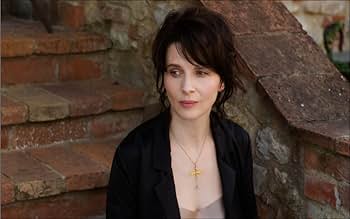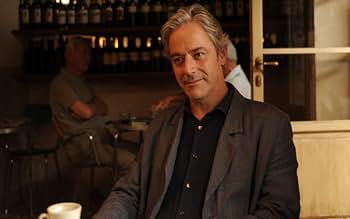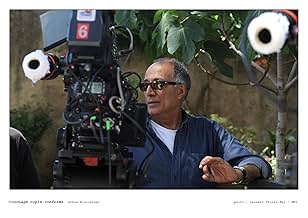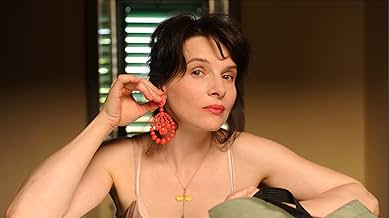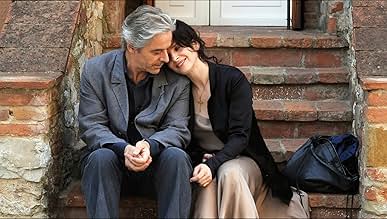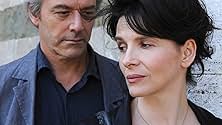PUNTUACIÓN EN IMDb
7,2/10
28 mil
TU PUNTUACIÓN
En la Toscana, un escritor británico de mediana edad conoce a una mujer francesa que lo lleva al pueblo de Lucignano.En la Toscana, un escritor británico de mediana edad conoce a una mujer francesa que lo lleva al pueblo de Lucignano.En la Toscana, un escritor británico de mediana edad conoce a una mujer francesa que lo lleva al pueblo de Lucignano.
- Premios
- 10 premios y 28 nominaciones en total
Filippo Trojano
- Le marié
- (as Filippo Troiano)
Manuela Balsimelli
- La mariée
- (as Manuela Balsinelli)
Argumento
¿Sabías que...?
- CuriosidadesDuring a visit in Tehran by Juliette Binoche, Abbas Kiarostami told Binoche the synopsis of Certified Copy as a casual anecdote, which she said that she fully believed until he confessed to having made it up. According to Kiarostami, studying the reactions of Binoche as she listened to the story was a vital part of the film's further development.
- Citas
James Miller: It seems to me that the human race is the only species who have forgotten the whole purpose of life, the whole meaning of existence is to have fun, to have pleasure. And here is someone who's found their own way to do it. We shouldn't judge them for it. If they're happy and enjoying life, we should congratulate them, not criticize them.
- ConexionesFeatured in Breakfast: Episodio fechado 31 agosto 2010 (2010)
- Banda sonoraO surdato 'nnamurrato
Written by Aniello Califano (as A. Califano) and the music by Enrico Cannio (as E. Cannio)
Reseña destacada
The Pitch: It's like looking in a mirror, only
not.
The Review: Juliette Binoche has had a career spanning nearly thirty years, and for much of that has jumped between roles in her natural language and English. You might think that, with the supposed paucity of good female roles in movies, that there's not much left for Binoche to cover that she hasn't before, but here she gets to explore some new territory to Cannes best actress award-winning effect. In the process, she gets to cover a range of languages, not only English and French but Italian, but in this case there is a specific purpose to the variances of the language.
The set-up is simple: William Shimell plays James Miller, an British author on a tour of Tuscany where his work on originality in art has been better received than in his homeland. Binoche is the woman who comes to hear his talk, and the two are then drawn together in a discussion of his work. Once the two meet again, the course of the movie charts their discussions over the course of an afternoon, taking in the Italian countryside and engaging with a number of characters along the way who cause them to reflect on their differing viewpoints on Miller's work.
There's a turning point as we approach the halfway mark where one of those characters seemingly mistakes the pair for a married couple. What starts as a role play, set off by the misunderstanding, takes on more and more aspects, and eventually both the pair and the audience are lost in the drama. The whole movie reveals itself to be an intricate construct on this concept, almost every aspect of the theme, the performances or the setting playing with the motif of originality versus imitation. Reflections in car windows sometimes obscure the actors themselves, POV shots ask us to engage directly in the drama almost as a participant and this even extends to the leading pair themselves – Shimell is a renowned baritone, not an actor, and there is a slight but noticeable difference between his performance and that of Binoche, which almost feels like a copy of acting rather than being fully immersed in the role.
While this reinforces the concept, it does prevent the audience from fully engaging, being kept slightly at arm's length by the constant artifice. That's not to say that there's not a lot to enjoy here, with the confusions and the tensions making this verge on a romantic comedy at times. Despite the differences in acting ability, Shimell and Binoche make an engaging couple at times and as time wears on, you find yourself more keen to believe that the beginning was the illusion and that their relationship is real and not the copy. Much of the credit for this must be placed at Binoche's door, using the language differences to vary mood effectively, but also adding colour and emotion in all of the languages she uses. The only one here who's on familiar ground is director Kiarostami, who's explored these themes before but never to such mainstream effect – worth checking out if you'd like to engage your mind and your heart.
Why see it at the cinema: There is a very literal aspect of the visuals which runs throughout the course of the movie, which the cinema screen will allow you to fully appreciate.
The score: 7/10
The Review: Juliette Binoche has had a career spanning nearly thirty years, and for much of that has jumped between roles in her natural language and English. You might think that, with the supposed paucity of good female roles in movies, that there's not much left for Binoche to cover that she hasn't before, but here she gets to explore some new territory to Cannes best actress award-winning effect. In the process, she gets to cover a range of languages, not only English and French but Italian, but in this case there is a specific purpose to the variances of the language.
The set-up is simple: William Shimell plays James Miller, an British author on a tour of Tuscany where his work on originality in art has been better received than in his homeland. Binoche is the woman who comes to hear his talk, and the two are then drawn together in a discussion of his work. Once the two meet again, the course of the movie charts their discussions over the course of an afternoon, taking in the Italian countryside and engaging with a number of characters along the way who cause them to reflect on their differing viewpoints on Miller's work.
There's a turning point as we approach the halfway mark where one of those characters seemingly mistakes the pair for a married couple. What starts as a role play, set off by the misunderstanding, takes on more and more aspects, and eventually both the pair and the audience are lost in the drama. The whole movie reveals itself to be an intricate construct on this concept, almost every aspect of the theme, the performances or the setting playing with the motif of originality versus imitation. Reflections in car windows sometimes obscure the actors themselves, POV shots ask us to engage directly in the drama almost as a participant and this even extends to the leading pair themselves – Shimell is a renowned baritone, not an actor, and there is a slight but noticeable difference between his performance and that of Binoche, which almost feels like a copy of acting rather than being fully immersed in the role.
While this reinforces the concept, it does prevent the audience from fully engaging, being kept slightly at arm's length by the constant artifice. That's not to say that there's not a lot to enjoy here, with the confusions and the tensions making this verge on a romantic comedy at times. Despite the differences in acting ability, Shimell and Binoche make an engaging couple at times and as time wears on, you find yourself more keen to believe that the beginning was the illusion and that their relationship is real and not the copy. Much of the credit for this must be placed at Binoche's door, using the language differences to vary mood effectively, but also adding colour and emotion in all of the languages she uses. The only one here who's on familiar ground is director Kiarostami, who's explored these themes before but never to such mainstream effect – worth checking out if you'd like to engage your mind and your heart.
Why see it at the cinema: There is a very literal aspect of the visuals which runs throughout the course of the movie, which the cinema screen will allow you to fully appreciate.
The score: 7/10
- movieevangelist
- 27 ene 2011
- Enlace permanente
Selecciones populares
Inicia sesión para calificar y añadir a tu lista para recibir recomendaciones personalizadas
- How long is Certified Copy?Con tecnología de Alexa
Detalles
- Fecha de lanzamiento
- Países de origen
- Sitios oficiales
- Idiomas
- Títulos en diferentes países
- Còpia certificada
- Localizaciones del rodaje
- Empresas productoras
- Ver más compañías en los créditos en IMDbPro
Taquilla
- Presupuesto
- 7.000.000 € (estimación)
- Recaudación en Estados Unidos y Canadá
- 1.373.975 US$
- Fin de semana de estreno en EE. UU. y Canadá
- 77.937 US$
- 13 mar 2011
- Recaudación en todo el mundo
- 7.736.632 US$
- Duración1 hora 46 minutos
- Color
- Mezcla de sonido
- Relación de aspecto
- 1.85 : 1
Contribuir a esta página
Sugerir un cambio o añadir el contenido que falta

Principal laguna de datos
By what name was Copia certificada (2010) officially released in India in Hindi?
Responde



